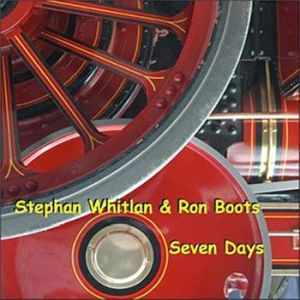STEPHAN WHITLAN & RON BOOTS: Seven Days (2017)
- Sylvain Lupari
- Apr 14, 2018
- 4 min read
Updated: Feb 21, 2021
“This is another very solid album of purely Berlin School out of Groove. But are we surprised that much!?”

1 In Traffic 20:16 2 Morning Flight 8:55 3 Walking Marley 9:33 4 Last Day 6:57 5 Slab 17:53 Groove | GR-233
(CD/DDL 63:35) (V.F.) (Sequencer-based Berlin School)
Ron Boots is a tireless worker and an unavoidable visionary in the field of EM. Year after year, his label Groove realizes a little find or digs up a one of the old guard. And 2017 is no exception! We were entitled to the splendid Sequencer Rarities from Rudy Adrian, besides of the very strong Fine Tunes from Beyond Berlin. And now it's Stephan Whitlan's turn to get out of the shade and offer a very good album of an EM built on the bases of old good Berlin School. Except to have heard his music with Graham Getty (Higher Green Session) and this infernal title in E-Scape on 2016, Deaf Four Longer, I know Stephan Whitlan only of name and reputation. We speak here about a precursor in the time of EM performed in the Sheffield circle, with John Dyson, who released a couple of albums in the course of a career filled with breaks and which goes back to 1994 with a first album, very well received by the critics of the time, Map Reference. Like its title seems to indicate it, SEVEN DAYS was conceived in seven days. Stephan Whitlan arrived with his ideas at Ron Boots' studios and together they shaped a strong and fair album which exceeds the 63 minutes of an EM concentrated on evolutionary movements of sequencers and on the unequivocal art of the synths control where soloes rain down from everywhere over the minimalist paths of SEVEN DAYS. Sibylline voices, wooshh and wiishh dragging particles of synthesizers and a laconic pulsation initiate our interest for SEVEN DAYS. The winds metamorphose into metallic colors while breaths of synths coo as these nightingales always sleepy. We are literally in the den of old Berlin School with these improvised solos which float among hallucinogenic mists, while the pulsation waits slowly for a way of exploring an axis of more livened up rhythm. But it is some sequences instead which sparkle and flash on the spot near the 3rd minute. They gambol and skip innocently, structuring a first phase of ambient and circular rhythm which modifies its axis at around the 6th minute with the arrival of the percussions and of another line of sequences which is showing its more melodious assets. Playing a little on the limits of a Bolero structure, In Traffic is gradually transformed into a strong electronic rock rather lively with lines of sequences which compete with the sober percussions and a solid line of bass. These rhythmic elements well installed, Ron Boots and Stephan Whitlan sculpture now some wonderful synth solos which overfly the increasing ascent of In Traffic such as sound squadrons, adding more weight and passion to this very good upward velocity which guides another monument of a minimalist Berlin School to be taken out of the Groove studios. Three shorter structures, all livened up by a good rhythmic life, nest between two long minimalist monuments of this album. Morning Flight bites our eardrums straight away with electronic percussions, kind of flying castanets, which call back one of the many good passages of Dark Side of the Moog IX. A line of bass sequences structures a catchy tempo where layers of synths with astral colors float with a harmonious precision on a semi-ambient movement. The synth blows here a nice spectral melody while the rhythmic structure stuffs itself with percussions and with sequenced arpeggios which sound at times like these African harmonious percussions. Those who think of Peter Baumann here are in the right move. There is also a little scent of Ron Boots in this title which reminds me some of the beautiful melodious passages of his Dreamscape. The addicts of synth solos will be still delighted by those in this title and as well as in the strange staggering structure of Walking Marley. A title that we can easily compare with Johannes Schmoelling's universe with a world all in contrasts and very catchy to the ear. An organic texture soaks in this pretty nice sound decor of which the wealth is divided with a very beautiful contribution of the many synth solos and ear-catchy percussive effects among which those rattler tones. Simple but terribly effective! In a slower, a more hesitating approach, Last Day takes also this frivolous and uncertain approach of Walking Marley. The rhythm skips like these steps and these light jumps of Fred Astaire dancing on clouds. It's purely cute and rather easy to hook on it. Slab concludes this album with strength. The structure is another upward phase of which the kind of Bolero and intensity is equal to In Traffic. The movement is more spasmodic and strongly bombarded by good percussions and a line of bass which crushes you to the senses. The solos which shout here suggest an approach more Netherlands School, more personal to Ron Boots, even with this sibylline zest which wraps a suite of rhythmic spasms where fly and spin so many synth solos. The rhythm takes a more fluid, a more rock, tangent after a short ambiospherical interlude filled with effects all so attractive, so giving the taste to restart the adventure of SEVEN DAYS to zero. Another solid album from Groove! Sylvain Lupari (April 14th, 2018) ***¾**
Available on Groove NL

Commentaires